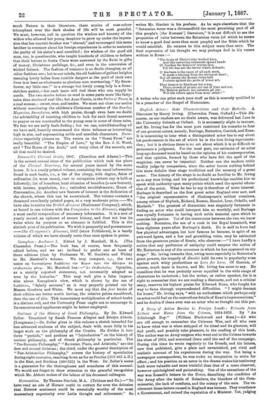English Actors : their Characteristics and their Methods. A Discourse
by Henry Irving. (Clarendon Press, Oxford.)—This dis- course, as our readers are no doubt aware, was delivered last June in the University Schools at Oxford. It is necessarily slight in texture, and Mr. Irving has for the most part restricted his remarks to four of our greatest actors, namely, Herbage, Betterton, Garriok, and Kean. It is interesting to hear what a distinguished actor has to say about his predecessors in the art of which he is the first living representa- tive ; but it is obvious there is no art about which it is so difficult to pronounce a judgment. For the most part, our estimate of an actor long ago deceased must be based on the opinion of his contemporaries, and that opinion, formed by those who have felt the spell of the magician, can never be impartial. Neither can the modern critic readily judge by comparison, since the actor leaves nothing behind him more definite than stage traditions and the memory of a great name. The history of the stage is no doubt as familiar to Mr. Irving as to any man living, and his professional knowledge enables him to speak with authority upon many points which need the special educa- tion of the actor. What he has to say is therefore of some interest. Herbage is described as the first great actor England ever saw, and "the original representative of Shakespeare's noblest creations, among others of Shylock, Richard, Romeo, Hamlet, Lear, Othello, and Macbeth." The greatest of dramatists was singularly fortunate in finding an actor who could interpret him so worthily, and Herbage was equally fortunate in having such noble material upon which to exercise his genius. Yet of the intercourse between the two we know nothing. Betterton, the eon of a cook in the Royal household, was born eighteen years after Herbage's death. He is said to have had few physical advantages, but how famous be became, in spite of an awkward figure, and a low and grumbling voice, may be estimated from the generous praise of Steele, who observes :—" I have hardly a, notion that any performer of antiquity could surpass the action of Mr. Betterion in any of the occasions in which he has appeared on our stage." Mr. Irving remarks that, owing more especially to Betterton's great powers, the tragedy of Hamlet held its own in popularity even against such witty productions as Love for Love. Of Garrick, of course, much more is known, and Mr. Irving has more to say. He considers that he was probably never equalled in the wide range of characters he undertook ; but the writer, or rather speaker, for it is right to remember that we are reading a discourse, and not a critical essay, reserves his highest praise for Edmund Kean, who fought his way to fame through unprecedented difficulties. " I might descant for hours," Mr. Irving says, " with an enthusiasm which perhaps only an actor could feel on the marvellous details of Kean's impersonations," and he doubts if there ever was an actor who so thought out this par.














































 Previous page
Previous page